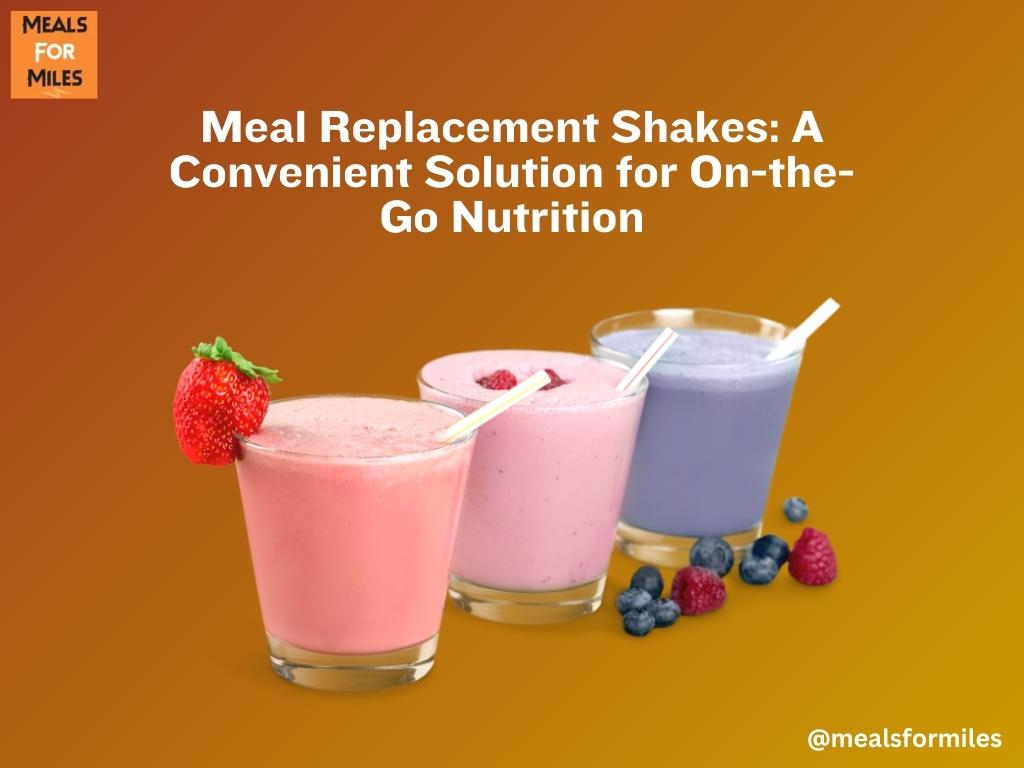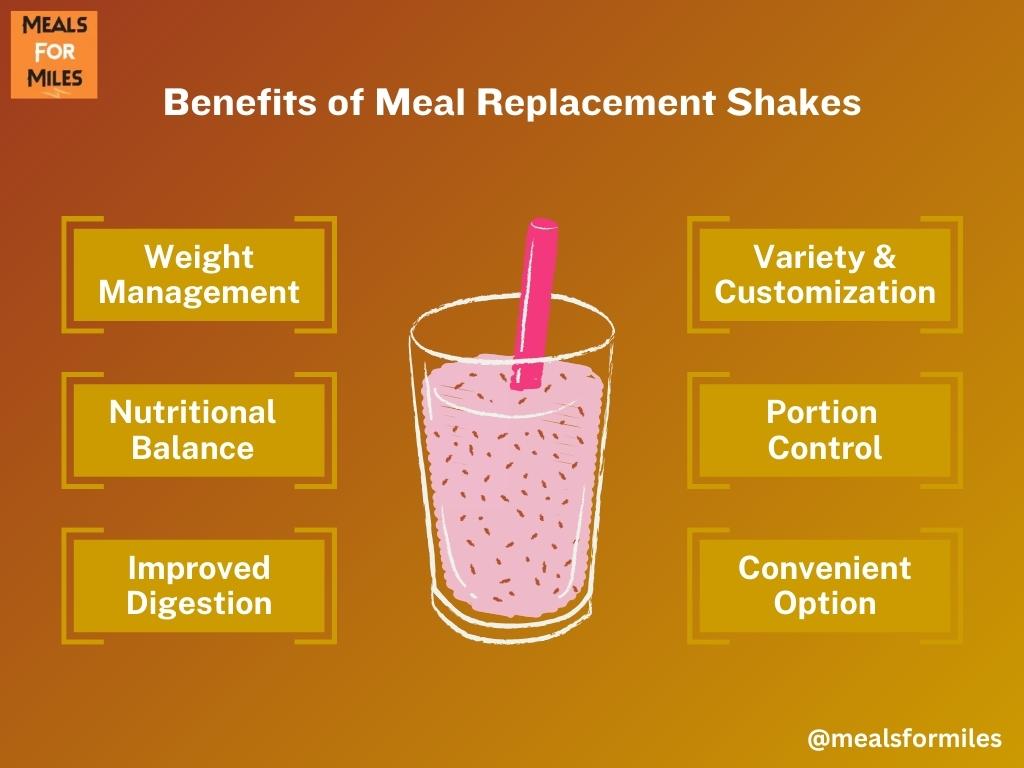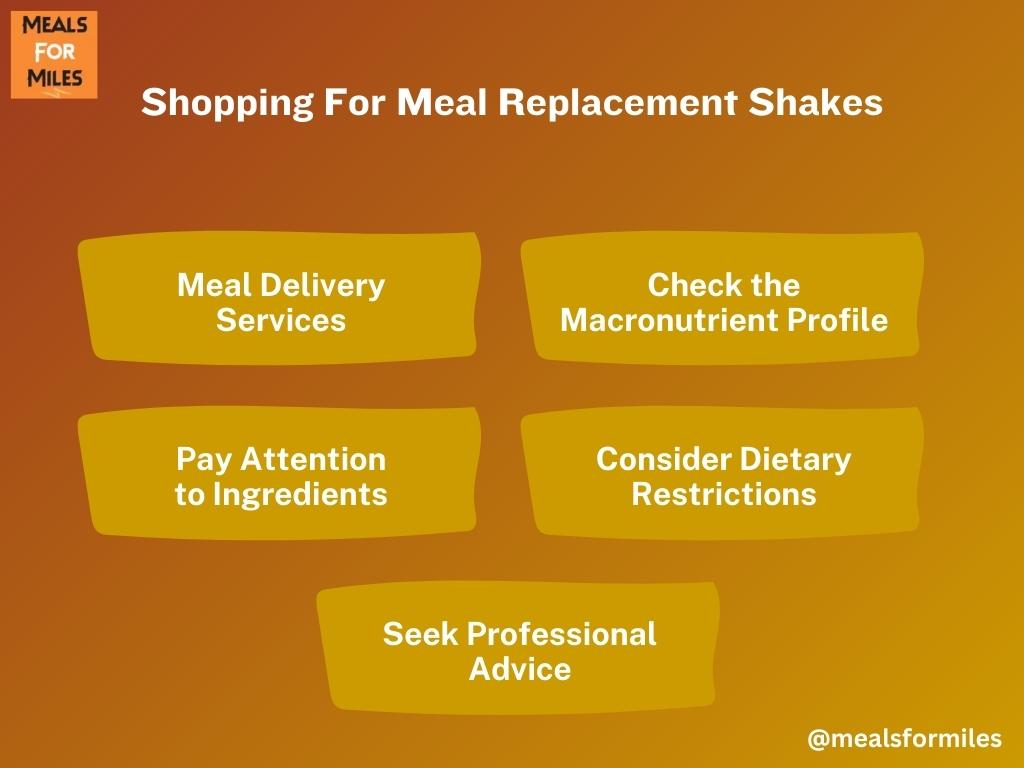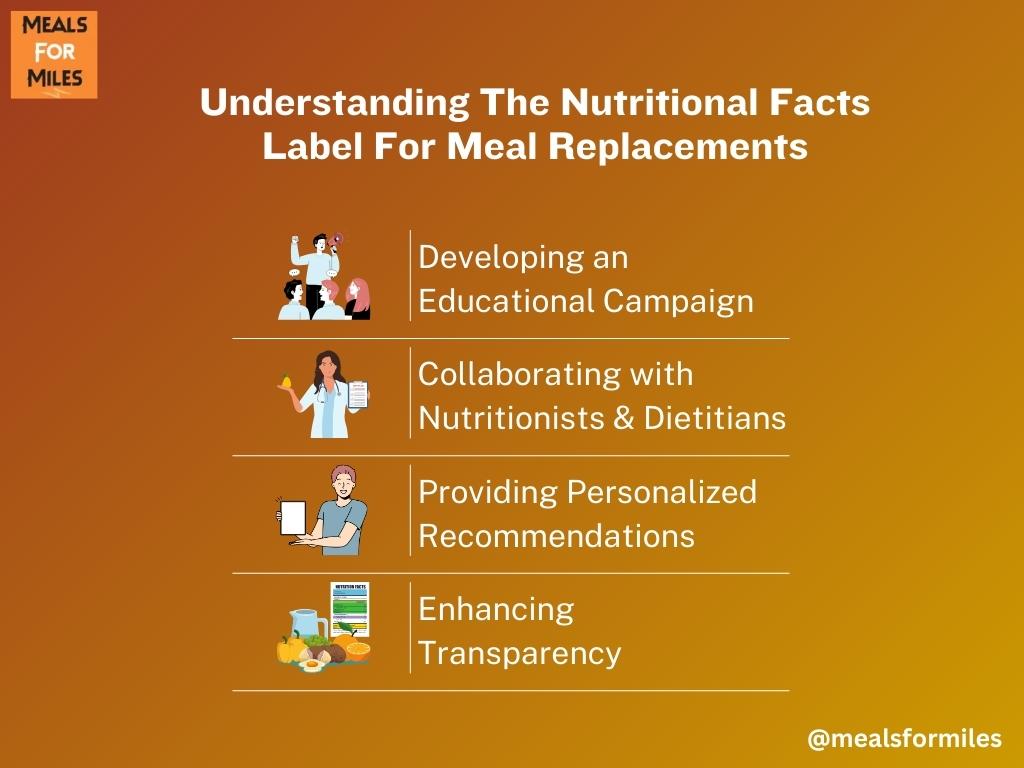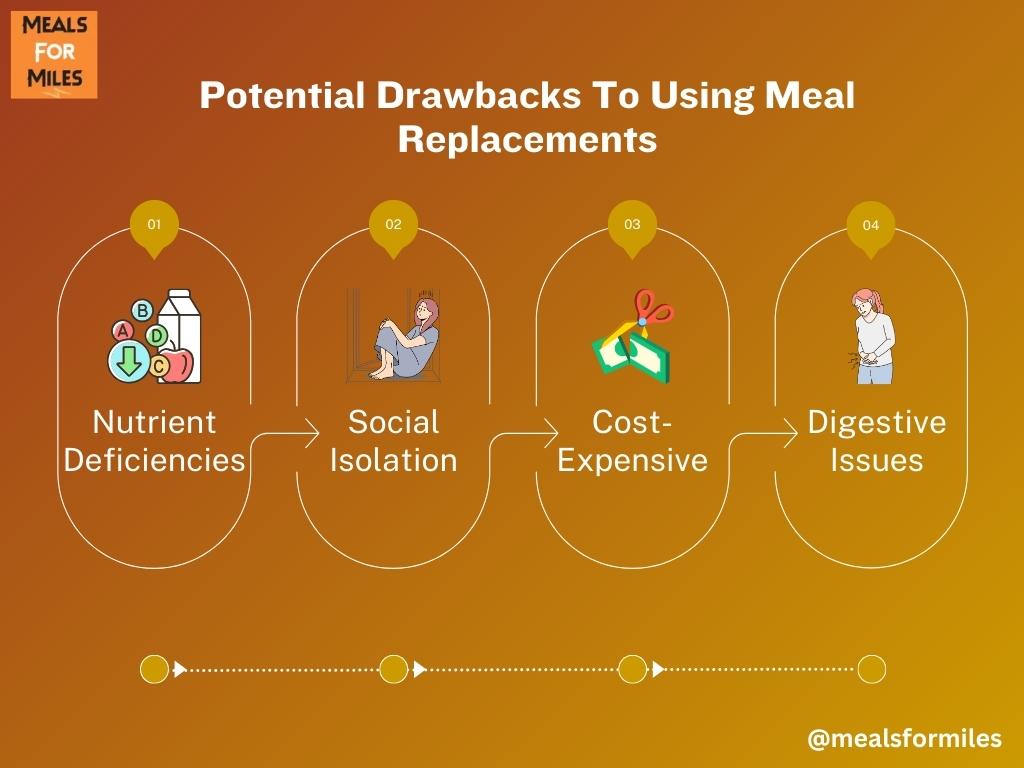Ready to take control of your nutrition and enjoy the convenience of meal replacement shakes?
Try our premium meal replacement shakes today and experience the benefits for yourself! Whether you’re looking to lose weight, build muscle, or simply maintain a healthy lifestyle, our shakes are tailored to suit your individual needs.
Meal replacement shakes offer a convenient and customizable way to improve nutrition and manage calorie intake. They come in various types to suit different dietary goals and preferences, but it’s essential to consider factors like protein content, ingredients, and nutritional labels when choosing the right one.
While meal replacements can be a valuable tool, they should be used in moderation and complemented with a balanced diet. Alternatives, such as whole foods and homemade meals, also provide nutritious options for meeting dietary needs. Ultimately, a personalized approach to nutrition is key to long-term health and well-being.
Table of Contents
- Introduction to Meal Replacement Shakes
- Benefits of Meal Replacement Shakes
- Types of Meal Replacement Shakes
- Shopping For Meal Replacement Shakes
- Preparing and Enjoying Meal Replacement Shakes
- Understanding The Nutritional Facts Label For Meal Replacements
- Tips For Making Delicious And Healthy Meals With Meal Replacements
- Potential Drawbacks To Using Meal Replacements
- Alternatives To Using Meal Replacements To Meet Nutritional Needs
- Final Thoughts
Introduction to Meal Replacement Shakes
Meal Replacement Shakes are an increasingly popular dietary supplement choice for those looking to increase their overall nutrition and control their calorie intake. Meal replacement shakes provide a convenient, time-saving solution for busy people or anyone who wants a healthy alternative to traditional meals.
They come in many forms, including bars, powders, ready-to-drink shakes, and even smoothies, and can be used as part of a complete meal or as a snack. Despite the wide variety of meal replacement options available on the market today, it is important to understand how these products work in order to make informed decisions about which one is best for your individual needs.
Benefits of Meal Replacement Shakes
Meal replacement shakes provide many benefits over traditional meals. Most notably, they are lower in calories than regular meals, making them ideal for weight loss or maintenance programs. Additionally, meal replacements can be easily customized according to individual preferences, such as taste preferences and specific nutritional needs, while still providing balanced nutrition with all essential vitamins and minerals required by the body on a daily basis. Furthermore, they are usually much quicker and easier to prepare than regular meals, making them perfect when time is of the essence or if you simply don’t have access to ingredients necessary for cooking up something delicious from scratch at home or at work.
- Convenience: Meal replacement shakes offer a quick and easy solution for busy individuals who may not have time to prepare a nutritious meal. They can be prepared in minutes and easily consumed on the go, making them a convenient option for those with a hectic lifestyle.
- Portion Control: With meal replacement shakes, portion control becomes much easier. Each shake provides a predetermined amount of calories, ensuring that individuals can easily track their intake and maintain a balanced diet. This can be particularly beneficial for those looking to lose or maintain weight.
- Nutritional Balance: Meal replacement shakes are designed to provide a complete and balanced nutritional profile. They often contain a mix of proteins, carbohydrates, fats, vitamins, and minerals, ensuring that individuals receive all the necessary nutrients for optimal health. This can be especially beneficial for those with specific dietary needs or restrictions.
- Weight Management: Meal replacement shakes can be an effective tool for weight management. By replacing high-calorie meals with lower-calorie shakes, individuals can create a calorie deficit, leading to weight loss. Additionally, the convenience and portion control aspect of meal replacement shakes can help individuals stay on track with their weight loss goals.
- Variety and Customization: Meal replacement shakes come in a wide range of flavors and varieties, allowing individuals to choose their preferred taste profiles. Moreover, they can be customized by adding fruits, vegetables, or other ingredients to enhance the taste and nutritional content. This flexibility ensures that individuals can enjoy their shakes while still meeting their specific dietary preferences and requirements.
- Improved Digestion: Some meal replacement shakes contain added fiber, which can help improve digestion and promote a healthy gut. This can be particularly beneficial for individuals who struggle with digestive issues or irregular bowel movements.
- Cost-Effective: Compared to purchasing ingredients for multiple meals, meal replacement shakes can often be a more cost-effective option. They eliminate the need to buy individual ingredients and can be an affordable alternative for those on a budget.
- Consistency and Convenience in Travel: Meal replacement shakes are a convenient option for individuals who frequently travel. They eliminate the need to rely on fast food or unhealthy snacks, providing a consistent and nutritious option that can be easily packed and consumed while on the go.
Overall, meal replacement shakes offer numerous benefits for individuals looking to maintain a healthy lifestyle, lose weight, or simply save time and effort in meal preparation. Their convenience, nutritional balance, and versatility make them a popular choice among those seeking a quick and efficient solution to their dietary needs.
Types of Meal Replacement Shakes
Meal replacement shakes come in a variety of types to cater to different dietary needs and preferences. There are protein-based shakes, which are ideal for those looking to increase their protein intake and build muscle. These shakes often contain whey or plant-based proteins and are suitable for athletes or individuals following a high-protein diet. For those aiming to lose weight, there are low-calorie or low-carb meal replacement shakes that can help control calorie intake and promote weight loss.
These shakes typically contain fewer carbohydrates and are fortified with vitamins and minerals to ensure balanced nutrition. Additionally, there are vegan or vegetarian meal replacement shakes that are free from animal products and made with plant-based protein sources such as soy or pea protein. These shakes are suitable for individuals following a plant-based diet or those with dietary restrictions. Overall, the different types of meal replacement shakes offer options for various dietary goals and lifestyles.
- Allergen-Free Meal Replacement Shakes: Develop meal replacement shakes that are free from common allergens such as gluten, dairy, nuts, and soy, to cater to individuals with specific dietary restrictions or allergies.
- Keto-Friendly Meal Replacement Shakes: Create meal replacement shakes that are specifically designed for those following a ketogenic diet, with high levels of healthy fats and low carbohydrate content.
- Organic Meal Replacement Shakes: Produce meal replacement shakes made from organic ingredients, appealing to health-conscious consumers who prioritize organic and natural products.
- Customizable Meal Replacement Shakes: Offer a range of meal replacement shake options that can be customized by consumers, allowing them to choose specific ingredients and nutritional requirements based on their individual needs.
- Senior-Friendly Meal Replacement Shakes: Develop meal replacement shakes with added nutrients and ingredients that cater to the specific dietary needs of older adults, such as increased calcium and vitamin D for bone health.
- High-Fiber Meal Replacement Shakes: Create meal replacement shakes with added fiber to support digestive health and promote feelings of fullness, appealing to individuals looking for a more satiating option.
- Energy-Boosting Meal Replacement Shakes: Formulate meal replacement shakes with added ingredients such as green tea extract or guarana to provide an energy boost, targeting individuals with busy lifestyles or those seeking a pre-workout option.
- Low-Sugar Meal Replacement Shakes: Produce meal replacement shakes with reduced sugar content, appealing to individuals looking to reduce their sugar intake without sacrificing taste or nutrition.
- Mental Wellness Meal Replacement Shakes: Develop meal replacement shakes with added ingredients such as omega-3 fatty acids or adaptogens, targeting individuals looking for a convenient option to support cognitive function and overall mental well-being.
- Kids’ Meal Replacement Shakes: Create meal replacement shakes specifically designed for children, with added nutrients and flavors that cater to their taste preferences, making it easier for parents to provide balanced nutrition for their kids on the go.
Shopping For Meal Replacement Shakes
Shopping for meal replacement shakes can be overwhelming, as there are so many options available on the market. It is important to carefully consider your nutritional needs and goals before making a purchase. One key factor to look for is the macronutrient profile of the shake, including the amount of protein, carbohydrates, and fats. Additionally, it is vital to check the ingredient list for any artificial additives or sweeteners. Reading customer reviews and comparing prices can also help to make an informed decision. Ultimately, finding a meal replacement shake that suits your dietary preferences and provides a balanced and nutritious meal replacement option is essential for maintaining a healthy lifestyle.
Here are the 8 Guidelines for Choosing the Right Meal Replacement Shake:
- Assess Your Nutritional Needs: Before purchasing meal replacement shakes, it’s crucial to determine your specific nutritional requirements and goals. Consider factors such as your daily calorie intake, required protein amount, and any dietary restrictions or preferences you may have.
- Check the Macronutrient Profile: Look for meal replacement shakes that offer a well-balanced macronutrient profile. The ideal shake should provide an adequate amount of protein, carbohydrates, and healthy fats. This balance will help keep you satiated and provide sustained energy throughout the day.
- Pay Attention to Ingredients: Carefully read the ingredient list to ensure that the shake contains wholesome and natural ingredients. Avoid shakes with excessive artificial additives, preservatives, or sweeteners. Opt for those with minimal ingredients and recognizable sources.
- Consider Dietary Restrictions: If you have specific dietary requirements, such as being lactose intolerant or following a vegan or gluten-free diet, opt for meal replacement shakes that cater to these needs. Many brands offer specialized options to accommodate various dietary restrictions.
- Research Customer Reviews: Reading reviews from other consumers can provide valuable insights into the taste, texture, and overall quality of different meal replacement shakes. Look for feedback on flavor, mixability, and effectiveness in achieving weight loss or muscle gain goals.
- Compare Prices: While cost shouldn’t be the sole determining factor, comparing prices can help you find a meal replacement shake that fits within your budget. Keep in mind that higher-priced options may offer better quality ingredients or more specialized formulations.
- Variety and Customization: Consider whether you prefer a wide range of flavors to avoid monotony or if you prefer a shake that can be customized with additional ingredients like fruits, vegetables, or nut butters. Some brands offer more variety and customization options than others.
- Seek Professional Advice: If you have specific health concerns or are unsure about which meal replacement shake is best for you, consult with a registered dietitian or nutritionist. They can provide personalized recommendations based on your individual needs and goals.
Remember, finding the right meal replacement shake is a personal choice that should align with your nutritional requirements and preferences. By considering these factors and doing thorough research, you can make an informed decision and find a meal replacement shake that supports your health and wellness goals.
Preparing and Enjoying Meal Replacement Shakes
Preparing and enjoying meal replacement shakes can be a convenient and nutritious way to fuel your body. The process of preparing these shakes is often quick and easy, requiring only a few simple steps. Whether using a pre-packaged shake mix or creating your own recipe, all it takes is adding the desired amount of liquid, such as water or milk, to the powder and blending it until smooth.
Once prepared, these shakes can be enjoyed as a meal replacement, providing essential nutrients and vitamins in a concentrated form. They are also versatile, allowing for customization with the addition of fruits, vegetables, or other ingredients to suit individual tastes. Whether used as a quick breakfast on busy mornings or as a post-workout refuel, meal replacement shakes offer a convenient and enjoyable way to maintain a balanced diet.
Here are the 10 Strategies in the Meal Replacement Shake Industry:
- Diverse Flavors and Varieties: The meal replacement shake industry has witnessed a surge in the availability of diverse flavors and varieties. This ensures that consumers can find a shake that suits their taste preferences, making the experience of meal replacement more enjoyable and satisfying.
- Customizable Nutritional Profiles: Industry leaders have recognized the importance of catering to individual nutritional needs. They offer meal replacement shakes with customizable nutritional profiles, allowing consumers to adjust the macronutrient composition according to their specific dietary requirements, such as high protein, low carbohydrate, or balanced options.
- Enhanced Convenience: To meet the demands of busy individuals, manufacturers have introduced innovative packaging solutions. Single-serve packets, pre-mixed bottles, and convenient on-the-go options make it easier than ever to prepare and consume meal replacement shakes, even when time is limited.
- Sustainable and Eco-friendly Packaging: Companies are increasingly using recyclable or biodegradable materials, reducing plastic waste, and adopting eco-friendly practices to align with the growing consumer preference for environmentally conscious products.
- Integration of Functional Ingredients: Many meal replacement shakes are now formulated with functional ingredients to enhance their health benefits. This includes adding probiotics for gut health, adaptogens for stress relief, or superfoods for an extra nutritional boost. Such formulations cater to consumers seeking a holistic approach to their health and wellness.
- Personalized Meal Replacement Plans: Some companies are taking a more personalized approach by offering tailored meal replacement plans. These plans consider factors like individual dietary restrictions, fitness goals, and lifestyle choices to provide a comprehensive solution for achieving optimal nutrition and weight management.
- Collaborations with Health Professionals: By working together, they can ensure that meal replacement shakes are designed to meet the nutritional needs of consumers and provide expert guidance on incorporating them into a balanced diet.
- Marketing Transparency: Transparency is becoming increasingly important in the industry. Leading companies are providing detailed nutritional information, ingredient sourcing, and manufacturing processes to build trust with consumers. This helps individuals make informed choices about the meal replacement shakes they consume.
- Integration with Technology: This includes developing mobile apps for personalized tracking, nutritional analysis, and goal setting. Technology integration allows consumers to monitor their progress, receive personalized recommendations, and stay motivated on their health journey.
- Expansion into New Markets: The meal replacement shake industry is expanding beyond traditional markets. Companies are targeting niche segments, such as athletes, busy parents, and older adults, by offering specialized formulations that cater to their unique nutritional requirements.
In summary, the meal replacement shake industry continues to evolve and innovate to meet the demands of modern consumers. With a focus on convenience, customization, and nutritional benefits, these shakes have become a convenient and enjoyable way to maintain a balanced diet in today’s fast-paced world.
Understanding The Nutritional Facts Label For Meal Replacements
Understanding the nutritional facts label for meal replacements is crucial for individuals who rely on these products for their daily sustenance. This label provides valuable information about the nutritional content and ingredients present in the meal replacement, enabling consumers to make informed choices about their dietary needs.
By examining the serving size, calorie count, and macronutrient breakdown, individuals can ensure they are meeting their specific dietary goals. Additionally, the ingredients list allows consumers to identify any potential allergens or substances they may want to avoid. Being well-versed in interpreting the nutritional facts label empowers individuals to make healthier choices and take control of their nutrition.
Here are the 8 Strategies for Enhancing Understanding of Nutritional Facts Labels for Meal Replacements:
- Developing an Educational Campaign: Launching an educational campaign aimed at raising awareness about the importance of understanding nutritional facts labels for meal replacements. This could involve creating informative videos, blog posts, and social media content that explains how to decipher the labels, understand serving sizes, and interpret macronutrient breakdowns.
- Collaborating with Nutritionists and Dietitians: Partnering with nutritionists and dietitians to help individuals better understand the nutritional facts label. This could involve hosting webinars or workshops where these experts can provide detailed explanations and answer questions about the information provided on the labels.
- Providing Personalized Recommendations: Developing an app or online platform that allows individuals to input their dietary goals and preferences can help them receive personalized recommendations based on the nutritional facts labels of various meal replacement products. This tool could calculate the ideal serving size, the macronutrient breakdown, and highlight any potential allergens or substances to avoid.
- Enhancing Transparency: Advocating for increased transparency in nutritional facts labels. This could involve pushing for clearer and more concise information, standardized serving sizes, and highlighting any potential health risks associated with certain ingredients. By working with regulatory bodies and food manufacturers, the industry can ensure that consumers have access to accurate and easily understandable information.
- Conducting Research and Development: Investing in research and development efforts to improve the nutritional value of meal replacement products. This could involve exploring ways to reduce the use of artificial ingredients, increase the inclusion of whole foods, and optimize macronutrient ratios.
- Engaging with Consumer Feedback: Actively seeking and utilizing consumer feedback to better understand the needs and preferences of individuals relying on meal replacements. This can be done through surveys, focus groups, or social media platforms.
- Promoting Education in Schools and Healthcare Facilities: Collaborating with educational institutions and healthcare facilities to integrate nutrition education programs. This can help individuals understand the importance of nutritional facts labels from a young age.
- Working with Influencers and Celebrities: Partnering with influencers and celebrities who promote healthy lifestyles and nutrition to educate and engage with consumers on the importance of understanding nutritional facts labels for meal replacements. This could involve sponsorship deals, collaborations on content creation, or hosting interactive Q&A sessions.
Tips For Making Delicious And Healthy Meals With Meal Replacement
Making delicious and healthy meals with meal replacements doesn’t have to be a daunting task. By following a few simple tips, you can create nutritious and satisfying meals that will help you stay on track with your health goals. Firstly, experiment with different flavors and combinations to keep your meals interesting. Mix and match fruits, vegetables, and protein sources to create a balanced and flavorful meal.
Secondly, don’t be afraid to add extra ingredients such as herbs, spices, or healthy fats to enhance the taste and nutritional value of your meal. Additionally, pay attention to portion sizes and ensure you are getting enough nutrients by including a variety of food groups in your meal.
Lastly, try to incorporate whole foods whenever possible and choose high-quality meal replacement products that are low in sugar and artificial additives. With a little creativity and planning, you can make delicious and healthy meals using meal replacements that will support your overall wellbeing.
Here are the 10 Innovative Strategies for Utilizing Meal Replacements in Healthy Meal Preparation:
- Recipe Development: Create new and exciting recipes using meal replacement products. Experiment with different ingredients and flavors to develop unique and delicious meals that are also nutritious.
- Subscription Services: Start a subscription service that delivers meal replacement products along with recipe ideas and meal plans, providing convenience and guidance to individuals looking to incorporate meal replacements into their diet.
- Catering with Meal Replacements: Offer meal replacement catering services for events, conferences, or corporate lunches. Provide a variety of tasty and healthy meal options using meal replacement products, catering to different dietary restrictions and preferences.
- Cooking Classes and Workshops: Host cooking classes or workshops where you teach people how to make delicious and healthy meals using meal replacements. Share tips, tricks, and recipe ideas to inspire individuals to incorporate meal replacements into their cooking routine.
- Meal Prep Services: Start a meal prep service that focuses on creating pre-packaged, portion-controlled meals using meal replacement products. This would cater to busy individuals who want to eat healthy but don’t have the time or knowledge to prepare meals themselves.
- Meal Replacement Food Truck: Create a food truck that serves nutritious and flavorful meals made with meal replacement products, allowing you to reach a wider audience and introduce them to the concept of using meal replacements in their diet.
- Cookbook for Meal Replacements: Write a cookbook specifically dedicated to meal replacement recipes. Include a variety of options for breakfast, lunch, dinner, and snacks, catering to different dietary needs and taste preferences.
- Product Development: Work with food manufacturers to develop new and improved meal replacement products that are not only tasty but also meet the nutritional needs of individuals looking to incorporate meal replacements into their diet.
- Research and Education: Conduct research studies on the benefits and effectiveness of meal replacements in achieving health goals. Share your findings through educational resources, such as articles, podcasts, or webinars, to help individuals make informed decisions about incorporating meal replacements into their diet.
- Integration with Health Apps: Collaborate with health and fitness apps to integrate meal replacement products into their platforms. This would provide users with personalized meal plans and tracking tools, making it easier for them to incorporate meal replacements into their daily routine.
Potential Drawbacks To Using Meal Replacements
While meal replacements can be a convenient option for those looking to manage their weight or save time, there are potential drawbacks to relying on them exclusively. One major concern is the lack of variety and enjoyment that comes with consuming the same pre-packaged shakes or bars every day. This can lead to boredom and a decreased satisfaction with meals, potentially leading to cravings or overeating.
Additionally, meal replacements may not provide the same level of satiety as whole foods, as they often lack the fiber and volume that comes with eating fresh fruits, vegetables, and whole grains. This could result in feelings of hunger and dissatisfaction, making it harder to stick to a meal replacement plan in the long term. Lastly, relying solely on meal replacements can limit the development of healthy eating habits and the skills needed to prepare balanced meals, which may be less sustainable once individuals transition away from the products.
Here are the 10 Considerations and Concerns When Using Meal Replacements:
- Nutrient Deficiencies: Meal replacements may not provide all essential nutrients found in whole foods, potentially leading to deficiencies in vitamins, minerals, or antioxidants, especially for individuals with specific dietary needs or medical conditions.
- Social Isolation: Relying on meal replacements can make social dining experiences challenging, as individuals may feel left out or excluded from regular meals with friends and family, impacting their sense of belonging and overall well-being.
- Cost: While meal replacements may seem cost-effective initially, exclusive reliance on them can become expensive over time compared to preparing meals from whole foods.
- Sustainability: Meal replacements may not be a sustainable long-term solution for weight management or overall health. Developing healthy eating habits and the ability to prepare balanced meals is essential for maintaining a healthy lifestyle, which may not be cultivated by solely relying on meal replacements.
- Lack of Personalization: Meal replacements are not personalized to individual dietary requirements or food sensitivities, potentially causing discomfort or adverse effects for those with specific needs.
- Psychological Impact: Relying solely on meal replacements may have negative psychological effects, leading to feelings of restriction or deprivation and potentially contributing to disordered eating patterns or an unhealthy fixation on weight management.
- Digestive Issues: Some individuals may experience digestive discomfort when consuming meal replacements due to their specific ingredients or formulation, resulting in bloating or irregular bowel movements.
- Lack of Long-Term Lifestyle Changes: While meal replacements can be useful in the short term, they may not promote long-term lifestyle changes. Failing to learn healthier choices and sustainable habits can make it challenging to maintain weight or health goals once meal replacements are discontinued.
- Potential for Over-Reliance: Excessive reliance on meal replacements can hinder the development of a balanced and varied diet, making it difficult to transition away from them and maintain a healthy relationship with food.
- Environmental Impact: The excessive packaging and waste associated with meal replacements contribute to environmental pollution and waste accumulation, negatively impacting the environment.
Alternatives To Using Meal Replacements To Meet Nutritional Needs
While meal replacements can be a convenient option for meeting nutritional needs, there are also alternatives available. One alternative is to prioritize whole, nutrient-dense foods in meals and snacks. This means incorporating a variety of fruits, vegetables, whole grains, lean proteins, and healthy fats into one’s diet. Another option is to opt for homemade smoothies or shakes using real ingredients such as fruits, vegetables, yogurt, and protein powder.
Additionally, meal prepping can be a helpful strategy to ensure balanced meals are readily available throughout the week. This involves preparing meals and snacks in advance, making it easier to incorporate a wide range of nutrients into one’s diet. Lastly, consulting with a registered dietitian can provide personalized guidance on meeting nutritional needs through whole foods and tailored meal plans.
Here are the 5 Nutritional Strategies and Alternatives to Meal Replacements:
- Emphasize Whole, Nutrient-Dense Foods: Prioritize whole, nutrient-dense foods in your meals and snacks. Incorporate a variety of fruits, vegetables, whole grains, lean proteins, and healthy fats into your diet to obtain a wide range of nutrients without relying on meal replacements.
- Homemade Smoothies and Shakes: Consider making your own smoothies or shakes using real ingredients like fruits, vegetables, yogurt, and protein powder. This allows you to create nutritious and customizable beverages that can replace meal replacements while giving you control over the ingredients.
- Meal Prepping: Engage in meal prepping to ensure balanced meals are readily available throughout the week. By preparing meals and snacks in advance, you can incorporate a variety of nutrients into your diet. Cook meals in batches and portion them out for convenience.
- Consult a Registered Dietitian: Seek guidance from a registered dietitian who can provide personalized advice on meeting your nutritional needs through whole foods and tailored meal plans. A dietitian can assess your specific requirements and create a plan that incorporates the right balance of nutrients and foods.
- Incorporate Variety: Emphasize the importance of incorporating a variety of foods into your diet to meet nutritional needs. Experiment with different fruits, vegetables, grains, proteins, and fats to ensure a diverse nutrient intake, which can enhance the enjoyment and satisfaction of your meals.
Final Thoughts
Meal replacement shakes are a convenient option for improving nutrition and controlling calorie intake. They offer benefits such as lower calorie options for weight loss, customization, and easy preparation. However, it is important to choose the right shake by considering ingredients, protein and fiber content, and additional vitamins and minerals. Reading and understanding the Nutrition Facts label is crucial. It is also important to use meal replacements in moderation and consult with a healthcare professional for a tailored plan. There are alternative options like smoothies, overnight oats, and homemade meals that can meet nutritional needs. The key is to find a balance and incorporate a varied and healthy diet.
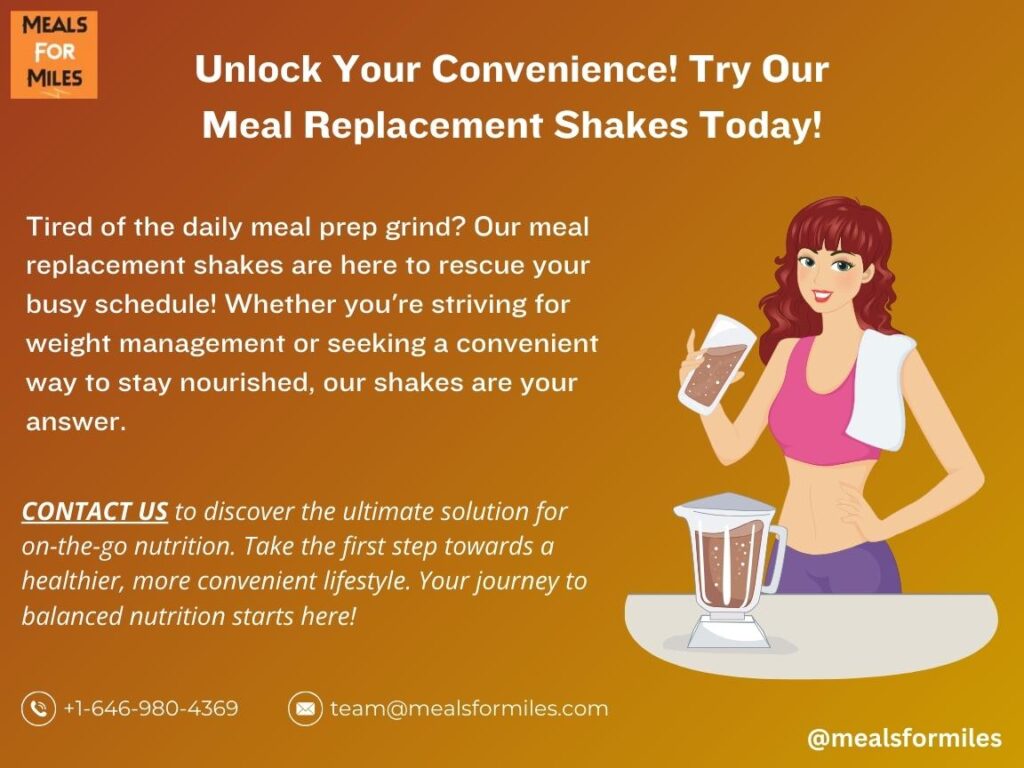
Don’t wait another day to start fueling your body with the nutrients it deserves.
Contact us now to explore our wide range of meal replacement shakes and find the perfect option for your dietary needs and goals. Take the first step towards a healthier you!

